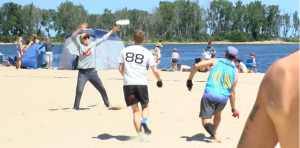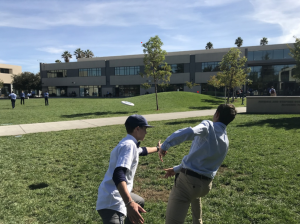16 The Power of Social Connections: Building Bonds through Frisbee in Universities
Jiajia Lin, Yule Zhang, Xinran Cheng
How did frisbee become popular in universities?
Frisbee, a sport that originated in the 20th century, has evolved into categories such as Ultimate Disc, Disc Golf, Freestyle Disc, and various competitions. However, what we want to discuss is still its most common and most popular way to play: one person throws a frisbee into the air, and another person stands at the other end to catch it. We all may have met people playing frisbee on campus. Frisbee sports can bring many benefits, such as health to students, but in establishing social networks, frisbee sports have unique advantages. Frisbee can quickly gather people with different traits to our social network, since it’s a sport easy to get started with, which makes it easy for people on campus, regardless of gender, weight, or even disability, to participate in sports – because the sport has few collisions so it’s safe to play. The participation of different individuals also ensures the inclusiveness of the social network, giving it a diverse moral ecology and helping to establish a thick institution, which like David Brooks said, “have a different moral ecology” and “take advantage of people’s desire to do good and arouse their higher longings” (Brooks, 2017). Thus, the social network will be warm and cohesive, helping you develop better in the future.

In what ways does the university provide support?
The sport of Frisbee is characterized by its freedom and versatility, allowing individuals from diverse backgrounds to connect through the game. Unlike tennis, swimming, or soccer, Frisbee does not have strict requirements regarding space, number of players, or skill level. This makes it highly accessible and inclusive.
Frisbee can be played in various settings, such as beaches or open grassy areas, and the number of players can be easily adjusted. It only requires a circle of people to start playing. Even beginners can quickly grasp the basics of the sport, as it is simple and easy to learn.
Moreover, Frisbees are lightweight and portable, making them convenient to carry. They don’t require significant physical space, allowing for impromptu games during picnics or on the road. This portability adds to the social appeal of Frisbee, as it can be enjoyed in different locations without much preparation or equipment.
The physical properties of Frisbee, combined with its simplicity and adaptability, make it an ideal sport for fostering social connections. It brings people together regardless of their background or skill level, providing a platform for interaction and camaraderie. Frisbee’s social attributes make it an excellent choice for building friendships and bridging gaps between individuals from different disciplines or backgrounds.
Uniting Students through Joyful Experiences
During my interview with Kevin, he shared a memorable experience from his college days that perfectly highlighted the power of social connections. As he reminisced, Kevin described a casual day at school when he and his friends spontaneously decided to play frisbee together. He emphasized that the game wasn’t driven by competitiveness, but rather a desire to cherish their time outdoors and enjoy each other’s company. Reflecting on that joyful moment, Kevin stated, “We weren’t playing to win or anything like that. We were just enjoying ourselves and having fun. We were exhausted by the end, but we were laughing and smiling like crazy. It was just a fun game.” These experiences emphasize the social network that flourishes within universities. The college provides numerous opportunities for students to form meaningful connections and create lasting memories.
Within the university environment, individuals unite, setting aside competition to bond over shared interests and passions. Whether through impromptu games or organized events, students can build relationships, foster camaraderie, and cultivate a solid social network that extends far beyond the classroom. By embracing the spirit of unity and support, college becomes a hub where diverse individuals come together, celebrating common ground and forming lifelong friendships.

“You might be opponents on the field, but, when the game is over, you are connected by your love of the sport. I know I can always laugh with players from other teams, and we support each other despite the competitive nature of what we do.” (ChildFund, 2019).
Reference:
How does sport connect people & communities?: Childfund Pass it back. ChildFund Rugby. (2019, September 10). https://www.childfundrugby.org/2019/05/02/how-does-sport-connect-people-and-communities/
Petan, G. (2023, February 6). What are frisbees used for?: Sports, competitions, and fun!. Promotional Products Blog. https://www.qualitylogoproducts.com/blog/how-are-frisbees-used/
Brooks, D. (2017, April 18). How to leave a mark on people. The New York Times. https://www.nytimes.com/2017/04/18/opinion/how-to-leave-a-mark-on-people.html
Wikimedia Foundation. (2023a, May 9). Frisbee. Wikipedia. https://en.wikipedia.org/wiki/Frisbee
Media Attributions
- A group of people playing Frisbee on the beach © Google adapted by Xinran Cheng is licensed under a CC BY-NC (Attribution NonCommercial) license
- Five guys playing frisbee on an empty grassland next to a teaching building. © Bell, T., Suh, M., & Bose, W. adapted by Yule Zhang is licensed under a CC BY-NC (Attribution NonCommercial) license

